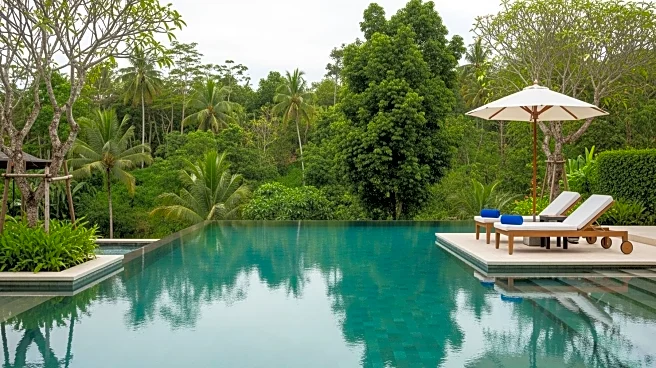What's Happening?
Aman Resorts, a luxury hospitality brand founded by Adrian Zecha in 1988, has evolved significantly over the years. Initially established with the opening of Amanpuri in Phuket, Thailand, the brand has expanded
to around 35 properties worldwide. Known for its boutique style and personalized service, Aman Resorts offers a unique experience that feels more like staying in a private home than a large resort. The brand has been recognized for its integration of local culture and its commitment to creating peaceful sanctuaries. However, since Zecha sold his stake in 2014, the brand has shifted towards a more mainstream and profit-focused approach, with new properties in urban locations like New York and Bangkok.
Why It's Important?
The evolution of Aman Resorts reflects broader trends in the luxury hospitality industry, where there is a growing demand for unique and personalized travel experiences. The brand's shift towards urban locations and the inclusion of residences and membership clubs indicate a strategic move to capitalize on its increasing popularity. This transition may attract a wealthier clientele, potentially altering the brand's original ethos of being an anti-pretentious sanctuary. The changes at Aman Resorts could influence other luxury brands to adopt similar strategies, impacting the competitive landscape of the hospitality industry.
What's Next?
As Aman Resorts continues to expand, it is likely to face challenges in maintaining its original brand identity while appealing to a broader market. The introduction of new properties in high-profile urban areas may attract a different demographic, potentially leading to a shift in the brand's customer base. The company's focus on maximizing return on investment could result in further changes to its business model, including more aggressive marketing strategies and partnerships. Stakeholders in the luxury travel sector will be watching closely to see how Aman balances its heritage with its growth ambitions.
Beyond the Headlines
The transformation of Aman Resorts raises questions about the sustainability of luxury travel and the ethical implications of expanding into previously untouched locations. As the brand becomes more mainstream, it may face criticism for contributing to over-tourism and cultural commodification. Additionally, the focus on profit maximization could lead to a dilution of the brand's unique offerings, potentially alienating long-time loyal customers. The hospitality industry will need to consider these factors as it navigates the balance between growth and preserving the authenticity of travel experiences.








